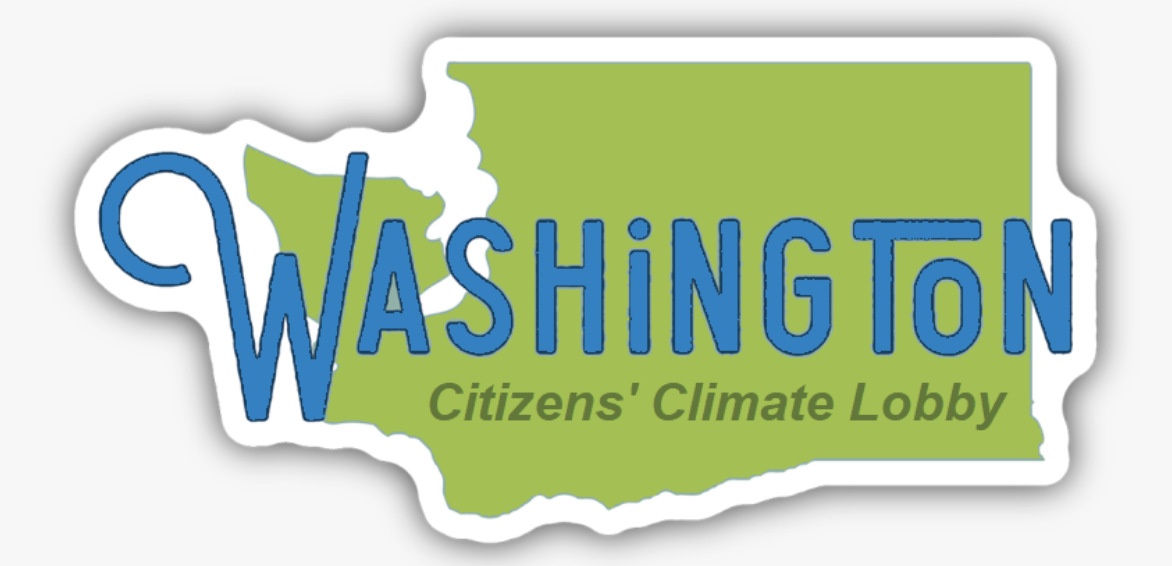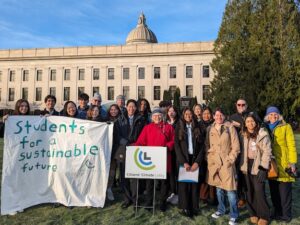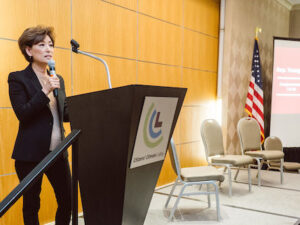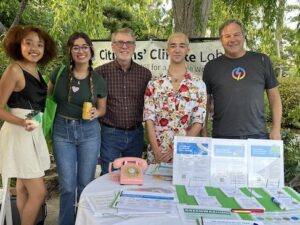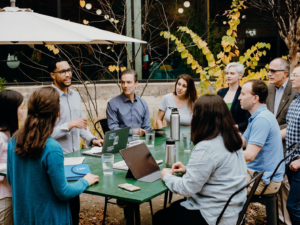Washington CCL Statement on Climate Auction Relief (CAR) Fund Proposal in Washington State Legislature
WASHINGTON STATE, Dec. 9, 2023 – Citizens’ Climate Lobby has long proposed that fees on carbon emissions be rebated to American families on a per-capita basis. We call this “carbon cashback.” While the “CAR Fund” proposal by Rep. April Connors (R-Kennewick) proposes to rebate only a portion of the carbon fee proceeds, and only to Washingtonians with a registered vehicle (vs. all Washingtonians), Washington State Citizens’ Climate Lobby (WA CCL) still believes that this is a good step toward addressing concerns about high gas prices. The proposed rebates will be more meaningful to working class Washingtonians experiencing higher gas prices but who have to drive to work, school or to visit and care for family members. WA CCL thanks Rep. Connors for bringing forth this innovative proposal while also expressing support for the emission reduction goals of the Climate Commitment Act that we all share.
Background
In 2021, the Washington Legislature passed the Climate Commitment Act. The Act caps greenhouse gas (GHG) emissions from major emitters in WA State and provides for quarterly auctions of GHG emission allowances. The Climate Commitment Act (CCA) is a major step forward on addressing the damaging impact of climate change in our state. Washington State Citizens’ Climate Lobby strongly supports the State’s policy established in the CCA to place a price on carbon emissions, set at quarterly auctions, as one of the most effective ways to unleash innovation across Washington on how best to reduce emissions to meet critical targets in 2030 and 2050 to reduce the impact of climate change on the state.
Because activities that emit carbon are so deeply embedded in our economy, placing a price on carbon will have an impact on prices throughout the economy. The CCA addresses this by directing the proceeds from the auctions to programs that help mitigate these increased costs, especially on frontline communities in the state. For example, the CCA funds $35 million to the Energy Utility Bill Assistance program and $80 million to the Home Electrification and Appliance Rebates Program.
One area not directly addressed by plans for distributing CCA funds is the effect of the carbon price on the price of gasoline. For a variety of reasons, most of which are not related to the CCA auctions, gasoline prices have risen rapidly in WA during 2023. The price of gasoline is unique in that it is highly visible — it is displayed on large lighted message boards on street corners across the state. Increasing the price is effectively a regressive tax on Washingtonians, since those least able to pay but who need to drive to jobs, school, or to care for family members are affected the most. It also is unclear to many Washington consumers why gas prices have increased, creating an opening for those who oppose the goals of the CCA to unfairly blame it for the entire amount of the rise. Since we are still in year one of auctions, Washingtonians don’t yet clearly see how the collected funds are being used, increasing the political opening for opponents of CCA.
The first quarterly auction of carbon credits was held in February 2023 and raised far more revenue than expected. In total, the 2023 auctions have brought in about $1.5 billion in revenue as of November 2023, versus $574 million projected by the state — and the revenue from the fourth auction on December 6 is still yet to be officially announced. While no one knows what auction prices will be in 2024 and beyond, the “cap” on emissions declines over time so it is reasonable to expect that the price per ton of emissions will increase, further increasing revenue to the state.
Rep. April Connors (R-Kennewick) plans to introduce a bill in the upcoming 2024 legislative session that would send all “extra” carbon auction funds back to Washington drivers as a check. Here’s how it would work:
-
- Registered vehicle owners would receive a $100 check — or up to $200 per family with two or more registered vehicles — next July. There would be no strings attached.
- After the July payment, Washingtonians would receive an annual check when they renew their car tabs.
- The check amount would vary depending on how much the state collects above what was forecasted to be collected in 2021 when the CCA was enacted.
- Individuals would be limited to one check, and everyone would receive the same amount, regardless of how little or how much they drive, or what the amount of their car tab renewal fees are.
“Citizens’ Climate Lobby has long proposed that fees on carbon emissions be rebated to American families on a per-capita basis,” said Steven Ghan, leader of the Tri-Cities chapter of Citizens’ Climate Lobby. “The modeling on this shows that economically disadvantaged Americans are helped more by this policy than those in the top part of the income distribution. The rebate proposed here isn’t exactly the same. It proposes to rebate only a portion of the carbon fee proceeds, and only to Washingtonians with a registered vehicle, not all Washingtonians. Nevertheless, we think this is a good step toward addressing concerns about high gas prices. The proposed rebates will be more meaningful to working class Washingtonians experiencing higher gas prices but who have to drive to work, school or to visit and care for family members. I especially want to thank my own representative, Rep. Connors, for bringing forth this innovative proposal while also expressing support for the emission reduction goals of the Climate Commitment Act that we all share.”
Citizens’ Climate Lobby understands that any proposed legislation goes through a process of comment and modification during the session, and we would like the following to be considered as positive changes in the proposal:
-
- The impact of higher prices on Washingtonians without a registered vehicle be addressed by directing a portion of the excess auction funds to the Working Families Tax Credit program or other ways to support frontline communities.
- Washington should pass pro-transparency and anti-price gouging legislation similar to the California Gas Price Gouging and Transparency Law. Oil corporations consistently report some of their highest profit margins in the country in Washington. For example, in December 2022 (before the launch of the Climate Commitment Act), the Seattle metro area was the second most profitable in the country, with a steep fuel profit margin of $1.09 per gallon. This is many times more than the same companies are making in other regions. ExxonMobil, Shell, Chevron and TotalEnergies made record-breaking annual profits globally in 2022 and posted their highest-ever Q1 net profits in 2023.
- Establish an easily accessible and understandable dashboard showing how CCA auction funds are being disbursed. California has such a dashboard at https://www.caclimateinvestments.ca.gov/cci-data-dashboard
For more information, contact:
Background Links
-
- Rep. Conors Op-Ed in the Tri-Cities Herald on the Proposal (October 22, 2023)
- Climate Commitment Act | Washington State Department of Ecology
- The Story of Washington’s Climate Commitment Act (CCA) | National Caucus of Environmental Legislators
- Washington’s Cap-and-Invest Auctions Frequently Asked Questions | Environmental Defense Fund
- Washington State Leads the Nation on Climate Action | Sightline Institute
- The biggest investment—ever—in clean energy coming to WA communities | Climate Solutions
- WA gas prices now highest in U.S.; some experts point to new climate legislation | The Seattle Times (PDF)
- WA’s cap-and-trade system may go up in smoke without reforms | Editorial by The Seattle Times (November 26, 2023)
- The Carbon Auction Rebate (CAR) program | Washington State House Republicans
- Lawmaker proposes sending WA families a gas tax refund check | The Seattle Times (PDF)
- April Connors video on the proposal
- Washington I-2117, Prohibit Carbon Tax Credit Trading Initiative (2024) | Ballotpedia
- Sparring on WA initiatives begins as signature-gathering continues | Washington State Standard
- California legislation on transparency and price gouging
- Proposed Carbon Cashback program in California – Bill Analysis, AB 858; California Climate Cashback Program
- Some ideas from Front & Centered on how to better target funds to frontline communities
###
Citizens’ Climate Lobby (CCL) is a nonprofit, nonpartisan, grassroots advocacy climate change organization focused on national policies to address the national and global climate crisis.
Our consistently respectful, nonpartisan approach to climate education is designed to create a broad, sustainable foundation to drive climate action across all geographic regions and political inclinations. By building upon shared values rather than partisan divides, and empowering our supporters to work in keeping with the concerns of their local communities, we work towards the adoption of fair, effective, and sustainable climate change solutions.
We train and support volunteers to build relationships with elected officials, the media and their local community.
Our volunteers include everyone from high school students to concerned grandparents, engineers in the natural gas industry, house painters, farmers, and everyone in between. Some are PhDs who have spent careers researching the intricacies of climate change; others are concerned citizens who just want to know how to help. Whatever our backgrounds, we’re all united by a commitment to making our voices heard as we call for action for a healthy climate.
CCL volunteers are organized into hundreds of local chapters across the U.S. and internationally, including a dozen here in Washington State. These chapters build political support for climate action with a variety of tools, which they use in keeping with their local culture and politics. By focusing on shared values rather than partisan divides, we build relationships with community leaders, local and state elected officials and with Congress, always starting from a place of respect and appreciation.

